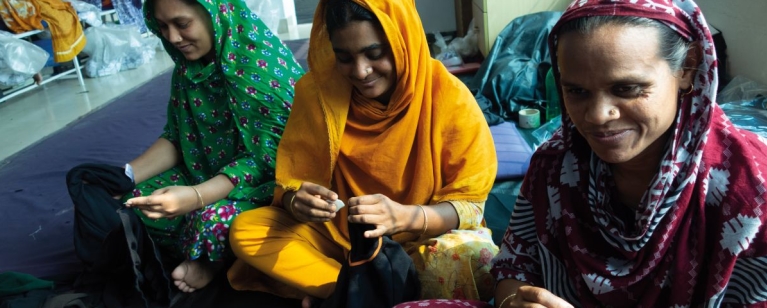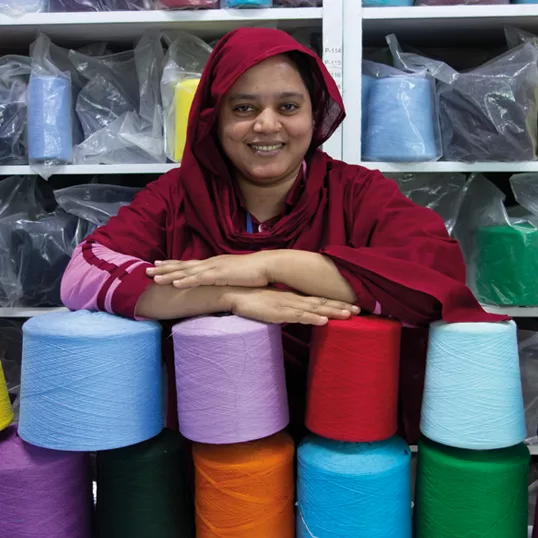
Common framework for responsible purchasing practices
Principle 1: Integration | Principle 2: Equal Partnership | Principle 3: Collaborative Production Planning
In July 2024, political unrest in Bangladesh caused significant uncertainty, underscoring the importance of responsible purchasing practices and strong partnerships in managing such challenges.
One+All, an employee-owned B Corp business based in Manchester, has worked to build long-term, transparent relationships with its supplier, New Horizon, in Bangladesh. Having worked together for 15 years, One+All is New Horizon’s key customer, further strengthening their partnership. This partnership has enabled both businesses to navigate crises and maintain stability, demonstrating the critical role that trust and collaboration play during times of disruption.
New Horizon’s partnership with One+All began in 2010 after Moinul Chowdhury and his brother took over the company. They initially continued working with multiple customers inherited from previous management, but over time, they discontinued these relationships due to incompatible business practices. Unlike those customers, One+All shared New Horizon’s commitment to ethical practices and long-term partnerships, leading them to focus exclusively on working with One+All.
The Importance of long-term partnerships
The relationship between One+All and New Horizon is grounded in long-term trust and shared values, essential during times of crisis. “On two significant occasions, One+All has stepped up and demonstrated exceptional commitment to us,” said Moinul Chowdhury, Chairman of New Horizon, reflecting on events that tested the strength of their partnership.
During the Rana Plaza disaster, One+All’s Managing Director personally visited the New Horizon factory to reassure the staff, ensure insurance was in place, and confirm compliance with regulations. This direct involvement played a key role in helping New Horizon improve health and safety standards, resulting in the factory achieving full compliance with Accord Bangladesh for workplace safety. Similarly, during the COVID-19 pandemic, One+All continued to support New Horizon, implementing health protocols and introducing a third-party grievance mechanism, including access to Amader Kotha, an anonymous hotline for workers to raise concerns, which remains active today.
"Of course, day-to-day, we face challenges and make mistakes," Mr. Chowdhury reflected. "But from those mistakes, we learn, apply those lessons, and continuously improve to make things better. What’s important is that every step of the way, we work together, we talk, and we focus on the people and the business—whether things are going well or when we face challenges." This mindset has been fundamental to the partnership’s resilience—not just in times of success, but in the shared commitment to overcoming challenges together.”
This long-term commitment has also translated into smoother day-to-day operations on the factory floor. The production team reported reduced pressure and minimal overtime, with an average of around two hours when necessary. This was attributed to One+All’s habit of sharing its annual production forecasts in advance, which allows the factory to plan ahead and adapt efficiently. As a result, there is no need for reactive supervision or high-pressure management practices that are common in many other factories.
It was the trust we had built over the years that kept our workers coming to work. They knew their welfare was our priority.
Crisis management in Bangladesh
Political unrest in Bangladesh posed significant threats to the garment manufacturing sector in July 2024. Factories were closed for days due to the unrest, and when production eventually resumed, the industry faced severe supply chain disruptions. Port congestion became a major issue as factories worked to catch up, creating a backlog of shipments and causing delays in the delivery of both goods and raw materials. The situation worsened when flash floods struck, further hindering transportation routes and complicating the clearing of cargo. These disruptions affected both suppliers and purchasing companies, leading to significant delays in shipping and difficulties in meeting production timelines.
The impact of these delays created widespread challenges for brands and suppliers already struggling with the unpredictability of the situation. Many buyers had to adjust their expectations and timelines to account for the backlog, while some faced strained relationships with customers affected by the delays. Smaller suppliers, in particular, struggled with limited resources, making it difficult for them to absorb the disruptions and adapt to the changing environment.
Despite the disruption, New Horizon’s workforce remained operational thanks to the trust built over years of collaboration with One+All. Moinul Chowdhury, Chairman of New Horizon, explains, “It was the trust we had built over the years that kept our workers coming to work. They knew their welfare was our priority.”
In response, One+All took immediate action to support New Horizon during the crisis, maintaining open communication with leadership and providing regular updates. Both the Managing Director and Overseas Director personally visited the factory to reassure the workforce, emphasising that One+All was committed to long-term partnership and that, even in the face of disruptions, the two organisations could overcome challenges together. This support helped to stabilise the situation, and workers felt reassured that their jobs were secure and their welfare was prioritised. Worker satisfaction with the factory’s work culture remains high, which has contributed to low staff turnover, even in times of national disruption. Observations at the factory revealed that several workers have remained employed for nearly two decades, a reflection of long-term trust and perceived job security.
The importance of shared responsibility
In contrast to the transactional nature of many industry relationships, One+All’s approach is focused on ensuring long-term sustainability. As Mr. Chowdhury notes, “Many brands will just move on to another supplier if things go wrong, leaving factories to handle problems on their own. This lack of responsibility harms both workers and businesses.”
One+All’s responsible purchasing practices focus on ensuring fair and sustainable pricing, fostering strong, transparent relationships with suppliers, and supporting the wellbeing of workers. This approach ensures that, even during difficult times, both parties are better equipped to navigate challenges and maintain operational continuity.
These practices demonstrate how One+All approaches its supplier relationships.
Ken Edgar at One+All, explains: “Maintaining strong relationships is vital, recognising that it is a mutually beneficial dynamic – the supplier relies on us, and we rely on them. This interdependence becomes particularly evident during challenging periods such as pandemics, industrial disputes, and geopolitical shifts, all of which have characterised the past decade’’. He added: “Our objective is to cultivate long-term partnerships to provide maximum support. This enables us to understand the challenges our suppliers face, so we can offer targeted assistance that optimises efficiency, controls costs, and supports mutual growth’’.
This foundation of mutual support and responsibility is reflected in New Horizon’s commitment to worker welfare and sustainable business practices. New Horizon is committed not only to fair wages but also to creating opportunities for workers’ children through education. "The lowest price is never sustainable," Mr. Chowdhury states. "A brand's responsibility goes beyond ensuring fair wages; it includes investing in human resources and worker welfare. Payments should contribute to workers' wellbeing and support health and safety standards."
Workers shared that salaries are consistently paid by the 5th of each month, and that they receive access to legally mandated entitlements such as maternity leave, sick leave, and annual holidays. While these are minimum standards, such provisions are not uniformly enforced across the sector, making New Horizon stand out as a positive exception. In addition, One+All has supported worker wellbeing beyond the factory itself, through an ongoing programme of initiatives that benefit workers.
One example is the gifting of water filter systems and first aid kits for home use. In addition, One+All is an early participant in the Employment Injury Scheme (EIS) Pilot, which safeguards workers and their families in the event of a catastrophic injury or death. These efforts reflect a deeper level of engagement in the day-to-day lives of workers and demonstrate the tangible impact of a long-term, responsible partnership.

Planning for the future
Looking ahead, One+All and New Horizon continue to prioritise collaborative production planning. One+All has taken proactive steps to ensure supply chain stability, such as maintaining inventory and preparing for potential disruptions. The crisis also prompted One+All to revisit their production plans, adopting preventative measures such as overbuying and extending delivery timelines. By maintaining stock inventory in the UK, they’ve mitigated risks for future disruptions, reducing potential impacts on suppliers and customers alike.
Ken Edgar, Overseas Director, reflects on the company’s response during the Bangladesh crisis: “Our ability to navigate crises is testament to the unwavering commitment to sustainable practices shared by our two businesses.” He adds, “Partnering with ETI has significantly strengthened our efforts, providing valuable insights and a robust framework that enables us to deliver the best possible outcomes for our colleagues, despite the constraints of time and resources.” The support and guidance provided through ETI have helped One+All embed responsible purchasing practices more deeply into their operations, reinforcing their long-term commitment to ethical trade. This underscores the effectiveness of their proactive measures in ensuring stability during uncertain times.
These practices collectively contribute to a stable and respectful working environment, even amid broader political and economic uncertainty. The long-term commitment between buyer and supplier has fostered a system where workers experience predictability, timely compensation, and improved wellbeing - outcomes that are not always guaranteed in the garment sector.
The partnership between One+All and New Horizon demonstrates that responsible purchasing practices, underpinned by mutual trust, two-way communication, and a shared commitment and responsibilities to ethical business practices, are crucial for resilience. By prioritising worker welfare and long-term partnerships, both companies have built a sustainable future for their supply chains, proving that responsible practices lead to positive change.
